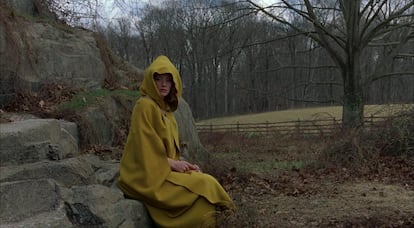Bask in the beautiful sadness of the fall with these 10 film gems
The most melancholy season of the year is usually associated with nostalgia and melodrama, and the work of directors like Douglas Sirk, John M. Stahl or Marcel Carné is perfect for it

Rainy, reddish, nostalgic, the fall is usually associated with certain film genres, cinematographic movements and even specific directors. It’s the pain, but also the hopefulness. One simply cannot think about melodrama, French poetic realism or the work of directors such as Douglas Sirk, John M. Stahl or Marcel Carné without picturing a distinct autumnal atmosphere and its sorrow. In this list, we recommend 10 titles that will fill your home with the wistfulness of the season.
Ordinary People (1980), by Robert Redford
How do you feel? Always the same question, over and over again. How do you feel? The one being questioned is a boy in his last year of high school. His older brother died in an accident, and he (double-edged knife, vertical lines; if you’re going to do something, do it right) just tried to kill himself. Now, outside the hospital, school has started and a fall of dry leaves and shattered nerves awaits, accompanied by a choral version of Pachelbel’s Canon. Robert Redford’s directorial debut is a heartfelt, painful, complex and hopeful work about the art of living, particularly in special circumstances. Some human beings choose affection; others, guilt; and yet others, such as the mother of the family (an excellent performance by Mary Tyler Moore), insensitivity. Ordinary People will always be remembered for winning the Oscar for Best Picture in the year of Raging Bull and The Elephant Man.
All That Heaven Allows (1955), by Douglas Sirk
The film spans the fall and part of winter, culminating at a momentous Christmas. And with each season of love between the mature widow with children in their twenties (Jane Wyman) and the handsome young gardener who prunes her trees every fall (Rock Hudson) and whom she had barely noticed, the light wind that runs through the story turns warmer instead of colder. The one responsible for this is Douglas Sirk, master of melodrama, who composes an ode to color in which red and blue share the screen (in the dresses, the lights, any object) to infuse the viewer with a dreamlike feeling that is both oppressive, within the story, and peaceful, for those watching it. Those who surround the unlikely lovers – hypocritical, meddling society – believe that tradition is respect for memory, but with the teachings of Henry David Thoreau’s Walden as a backdrop, they do not realize that what runs through their minds is classism in a cocktail dress. The sequence in which Wyman questions herself in front of her reflection on the television screen is part of cinema history.
The Village (2004), by M. Night Shyamalan
Defying the rules, a beautiful wild flower comes out of the ground without anyone having planted or watered it, and the village children cut it and bury it so that no one discovers it. Spring is banned here. The color of that flower too, the one that attracts “those we do not speak of.” The word “red” is not once uttered in the film. For the people of The Village, the boundary between good and evil is not only moral; it is also physical – even legal. That is why, in that community far from civilization, locked in its own fear in its autumn stronghold, there is no room for the attitude of a young blind woman who sees what others do not: freedom. Shyamalan, a master of horror and an expert in jaw-dropping endings, presents a metaphor for so many things around politics, ideals and religion. Violence can breed monsters more dangerous than violence itself. As one of the characters says: “Heartache is a part of life.”
Late Autumn (1960), by Yasujiro Ozu
A man has died, and his friends insist on marrying his twenty-something daughter first, and then the still young widow, without anyone having asked them to. Just because. Because of the (in)culture of marriage in Japan in the 1950s and 1960s. “For me, love and marriage don’t have to go together,” says the rebellious young woman. A new era, fresh air in a society stuck in the will of men. Ozu, a genius of stillness, perspective and restraint, with his wonderful low-angle shots, presents two independent women, mother and daughter, who work and go out to dinner alone, fun, complicit, among a group of unbearable pests. It is the late, happy autumn of a single woman who makes her own choices.
Autumn Tale (1998), by Éric Rohmer
Another film about meddling people looking for a boyfriend for a mature woman, whether she wants one or not. This time, however, the matchmakers are not the men, but the women: a friend who is trying to find her a boyfriend in an attempt to compensate for her own marital dissatisfaction and, in the process, flirt with the man she found through an ad in the local newspaper; and the young girlfriend of the widow’s son, who is determined to foist none other than her mature ex-lover and ex-teacher on her. Among vineyards, with the first fresh winds of the fall and his usual endless conversations, Rohmer presents the last of his Tales of the Four Seasons as a light comedy about the contradictions of human beings and the often stupid forms that attraction, desire and liberation take.
Falling Leaves (1912), by Alice Guy
A young woman, illness, affection, care, perhaps death. Way before films like Terms of Endearment and Stepmom (also perfect for a good autumn cry), Alice Guy had already tapped the power of the drama of suffering with this 12-minute short film (available on YouTube). “When the last leaf falls, she will have passed away,” a doctor with poetic aspirations and raw sincerity tells the family. However, the sick girl’s little sister, about six years old, has a solution: to go out into the garden with some strings and tie the leaves to the trees so that they never fall, in a cinematic moment of overwhelming tenderness. Guy, a pioneering woman in directing, breaks clichés before they even exist: when a character coughs in a film, it does not necessarily mean that they are close to death.
Damage (1992), by Louis Malle
“Damaged people are dangerous. They know they can survive.” Juliette Binoche, with an almost always blank expression that can either be ice or fire, is a young woman with a dark past. Her silent gaze never reveals if she is scrutinizing, judging, seducing or despising. At her side, the powerful British minister, an elegant, emotionally distant father, is a mere toy, a wimp, a somber man destined for lust and destruction. He is also the father of her boyfriend. “I had never felt anything like this. I need to sort out my feelings. I know it will be difficult for Martin… he is attached.” “He loves me.” “I know. But he’s young, he’ll get over it.” “He is your son.” Damnation. A harsh idyll woven by the pen of renowned playwright David Hare. With its cold, harrowing notes, the music of Zbigniew Preisner – Kieslowski’s usual composer – completes a sound and emotional panorama that can only peak with the falling of the leaves. Or better yet, with the falling of the tree.
Autumn Sonata (1978), by Ingmar Bergman
The mother is strength; the daughter is insecurity. The mother, a prestigious concert pianist and a vain, inflexible, icy woman, is the cause of the daughter’s self-doubt. Despite everything, the fragile woman admires that person who never allowed her to conquer anything. “There is only one truth and one lie,” Bergman wrote for the film. The director, another harsh, distant and sour father, seems to reflect his own personality in Ingrid Bergman’s role; another arrogant, cruel intellectual based on himself. Sparks flew between the two Bergmans during the shooting. Among other things, the actress did not understand the seven minutes in which mother and daughter consecutively play Chopin’s Prelude No. 2. “People will fall sleep,” Ingrid believed. She clearly did not comprehend what the director’s vision could do in that sequence that she considered useless and that in reality shows the inside of two women burned by their blood.
Sunset Song (2015), by Terence Davies
Distant Voices, Still Lives; The Long Day Closes; The Deep Blue Sea; A Quiet Passion; Benediction. Much of the filmography of the British director Terence Davies, his art, his warmth and his calmness, smells like autumn – despite the oppressive environments that he usually portrays. Like that of Sunset Song: a mother condemned to having one child after another; an abusive father; a young woman with a knack for writing, who moves the viewer with each inner monologue. The Scottish land gives you everything and takes it all away: roots, identity, destiny, violence. Traditional music envelops the tragedy and the drive of a young woman trapped in the wrong time, in an elegy about a way of living and a way of dying. Without a doubt, the most dramatic and disturbing of all the recommendations of this list. Also one of the most beautiful.
Main Street (1956), by Juan Antonio Bardem
A joke. The tremendous, brutal joke of some provincial dandies in the gray Spain of the 1950s. “Bored people,” declares the city intellectual, defining the cruel group of buffoons who decided to lie to one of the city’s spinsters to make her believe that one of them, the only one who has not yet walked down the aisle, wants her as his bride. “I love her like someone loves a puppy or a sick child,” the liar apologizes when he finds himself cornered, overwhelmed by his companions, rightfully insulted by other friends from outside, the usual voice of conscience in the films of Juan Antonio Bardem. And the woman waits, and suffers behind the window, under the autumn rain, for the rest of her dull, gray, silent life, in a stale, sexist and degrading country. “We women cannot do anything else; just wait, on the corners, in the arcades, walking along Main Street, behind the windows...”
Sign up for our weekly newsletter to get more English-language news coverage from EL PAÍS USA Edition
Tu suscripción se está usando en otro dispositivo
¿Quieres añadir otro usuario a tu suscripción?
Si continúas leyendo en este dispositivo, no se podrá leer en el otro.
FlechaTu suscripción se está usando en otro dispositivo y solo puedes acceder a EL PAÍS desde un dispositivo a la vez.
Si quieres compartir tu cuenta, cambia tu suscripción a la modalidad Premium, así podrás añadir otro usuario. Cada uno accederá con su propia cuenta de email, lo que os permitirá personalizar vuestra experiencia en EL PAÍS.
¿Tienes una suscripción de empresa? Accede aquí para contratar más cuentas.
En el caso de no saber quién está usando tu cuenta, te recomendamos cambiar tu contraseña aquí.
Si decides continuar compartiendo tu cuenta, este mensaje se mostrará en tu dispositivo y en el de la otra persona que está usando tu cuenta de forma indefinida, afectando a tu experiencia de lectura. Puedes consultar aquí los términos y condiciones de la suscripción digital.









































